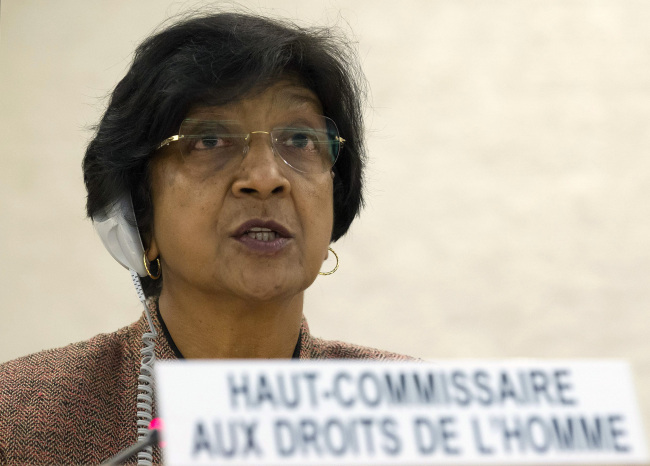North Korea under growing pressure over human rights
By Shin Hyon-heePublished : June 19, 2012 - 20:10
The campaign for North Koreans’ human rights is receiving fresh impetus as South Korea, the U.S. and the international community are ratcheting up pressure on the repressive regime to address grave living conditions and cease punishment of repatriated defectors.
Seoul and Washington have been calling on the communist state to dismantle political prisons and divert scarce resources to food supplies. They are also beefing up cooperation to free four South Korean activists held in China, a shift from their long-standing policy focus on denuclearization.
On Monday, the U.N.’s human rights chief Navi Pillay urged North Korea’s neighbors to comply with the principle of non-refoulement, which forbids turning over “victims of persecution.”
“The situation in the DPRK remains of serious concern, particularly the issue of political prison camps, public executions and the persisting food shortage,” she said in her opening remarks at a U.N. Human Rights Council session in Geneva.
Seoul and Washington have been calling on the communist state to dismantle political prisons and divert scarce resources to food supplies. They are also beefing up cooperation to free four South Korean activists held in China, a shift from their long-standing policy focus on denuclearization.
On Monday, the U.N.’s human rights chief Navi Pillay urged North Korea’s neighbors to comply with the principle of non-refoulement, which forbids turning over “victims of persecution.”
“The situation in the DPRK remains of serious concern, particularly the issue of political prison camps, public executions and the persisting food shortage,” she said in her opening remarks at a U.N. Human Rights Council session in Geneva.

DPRK is the acronym of North Korea’s official name, the Democratic People’s Republic of Korea.
“I call on the DPRK authorities to allow access to independent experts and organizations to the country. I also urge neighboring countries to respect the principle of non-refoulement as there are reports of DPRK citizens forced to return to their country after seeking international protection,” added Pillay, high commissioner for human rights to the council.
Her speech marks the first official reference to North Korean human rights issues at the council’s meetings.
It also adds to growing calls on China to stop repatriating North Korean refugees. In late May, the European Parliament subcommittee on North Korea’s human rights took up a resolution in a related move.
The discussions evolved last week when Robert King, U.S. special envoy for North Korean human rights issues, made a rare weeklong visit here.
He sought with Seoul officials ways to resolve China’s detention of Kim Young-hwan and three other activists since late March on charges of “damaging national security.” They have been denied access to their families and legal consultation.
China has long been criticized for deporting defectors, whom it calls “illegal economic migrants” despite the torture, labor camps or even death they face back home, based on a decades-old agreement with the North.
Pyongyang’s major ally and economic patron has been stepping up its crackdown since mid-March on foreigners who illicitly crossed the border, obtained jobs and overstayed their visas.
While in China, defectors may suffer hardships including forced slavery or prostitution to avoid being dragged back to their authoritarian homeland, said Kim Hee-tae, secretary-general of the Group for North Korea Human Rights.
“They cannot but opt to move deeper into the dark sides of society where there is no protection whatsoever for their human rights on fear of repatriation,” Kim told The Korea Herald.
The North has dismissed accusations of rights abuses, saying Washington has the “bad habit of malignantly slandering the independent countries opposed to its high-handed practices” by politicizing the issue.
“If the U.S. is to truly respect the human rights of the Korean people, it should immediately roll back its hostile policy toward (North Korea) and stop military provocations against it and moves to tighten the sanctions and stifle it,” a recent statement carried by the official Korean Central News Agency said.
According to the Unification Ministry, more than 23,500 North Koreans have taken refuge in the South since the 1950-53 Korean War. Many of them have reported a wide range of abuses in the North such as torture and public executions.
A 2011 U.S. congressional report estimated that up to 100,000 North Korean orphans live in China.
In the U.S. State Department’s report on human rights in 199 countries released in April, the North was graded as “extremely poor” and remained at the bottom of the agency’s list along with China, Iran, Syria, Turkmenistan, Uzbekistan and Belarus.
Up to 200,000 people are locked in six prison camps across North Korea, said Amnesty International, a London-based human rights watchdog, in its annual report published in May.
The bulk of the prisoners were incarcerated not for dissent but for minor violations such as singing South Korean songs, according to South Korea’s National Human Rights Commission.
By Shin Hyon-hee (heeshin@heraldcorp.com)





![[From the Scene] Monks, Buddhists hail return of remains of Buddhas](http://res.heraldm.com/phpwas/restmb_idxmake.php?idx=644&simg=/content/image/2024/04/19/20240419050617_0.jpg&u=20240419175937)








![[From the Scene] Monks, Buddhists hail return of remains of Buddhas](http://res.heraldm.com/phpwas/restmb_idxmake.php?idx=652&simg=/content/image/2024/04/19/20240419050617_0.jpg&u=20240419175937)

![[KH Explains] Hyundai's full hybrid edge to pay off amid slow transition to pure EVs](http://res.heraldm.com/phpwas/restmb_idxmake.php?idx=652&simg=/content/image/2024/04/18/20240418050645_0.jpg&u=20240419100350)

![[Today’s K-pop] Illit drops debut single remix](http://res.heraldm.com/phpwas/restmb_idxmake.php?idx=642&simg=/content/image/2024/04/19/20240419050612_0.jpg&u=)